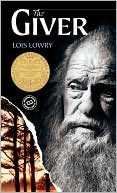 The Giver
The Giver by Lois Lowry is set in the community, a place where everyone dresses the same, lives in similar houses and life is free from unemployment, disease and war.
This utopian society is not without it's flaws. And as the story begins, we are slowly shown the cracks in this carefully constructed society. Young Jonas, age 11 is about to experience the Ceremony of Twelve. It is the last of the ceremonies in the community. They occur each December. At age nine, the youngsters receive their bicycles, at age one, the babies are given a family. At age 12, the kids are given a career path.
At the ceremony, Jonas finds out he is to be the Receiver of the community. The Receiver is the one person who has access to how things used to be before they formed the community--it's memories, it's history, all locked up in this one person. As one Receiver ages, another one must be trained. Jonas will be that person. As the Receiver, he can ask questions that other members of the community cannot and the members must tell him the truth. That's when things start to fail. Jonas asks what happens when someone is released from the community. The current Receiver, known to him as The Giver shows Jonas a video of someone being released. Jonas learns later that it was the Giver's daughter. It is this knowledge that changes everything Jonas thought he knew about the community and leads to him choosing a difficult path...
The Giver won the Newbery when it was released in 1994--way before the trend of dystopian fantasies. Lowry first shows us the structure of the community --it's sameness, by showing everyone eating the same thing, wearing the same clothes, even riding the same bicyles. Then she unpeels the layers like you would an onion--slowly, carefully. The community seems slightly creepy in it's concise functionality, making it more and more dysfunctional. You root for Jonas to ask the right questions and make the right decisions. The writing is straightforward, there is no navel-gazing, no flowery words. The language is simple and clean much like the community itself. I found the book to be slightly disturbing and didn't like it at first. But upon further reflection, I believe this was Lowry's intent. We shouldn't like a society that eliminates individuality. We should celebrate our differences not suppress them.
Anon,
Nancy
Next up:
The Penderwicks

 The Giver by Lois Lowry is set in the community, a place where everyone dresses the same, lives in similar houses and life is free from unemployment, disease and war.
The Giver by Lois Lowry is set in the community, a place where everyone dresses the same, lives in similar houses and life is free from unemployment, disease and war. 

